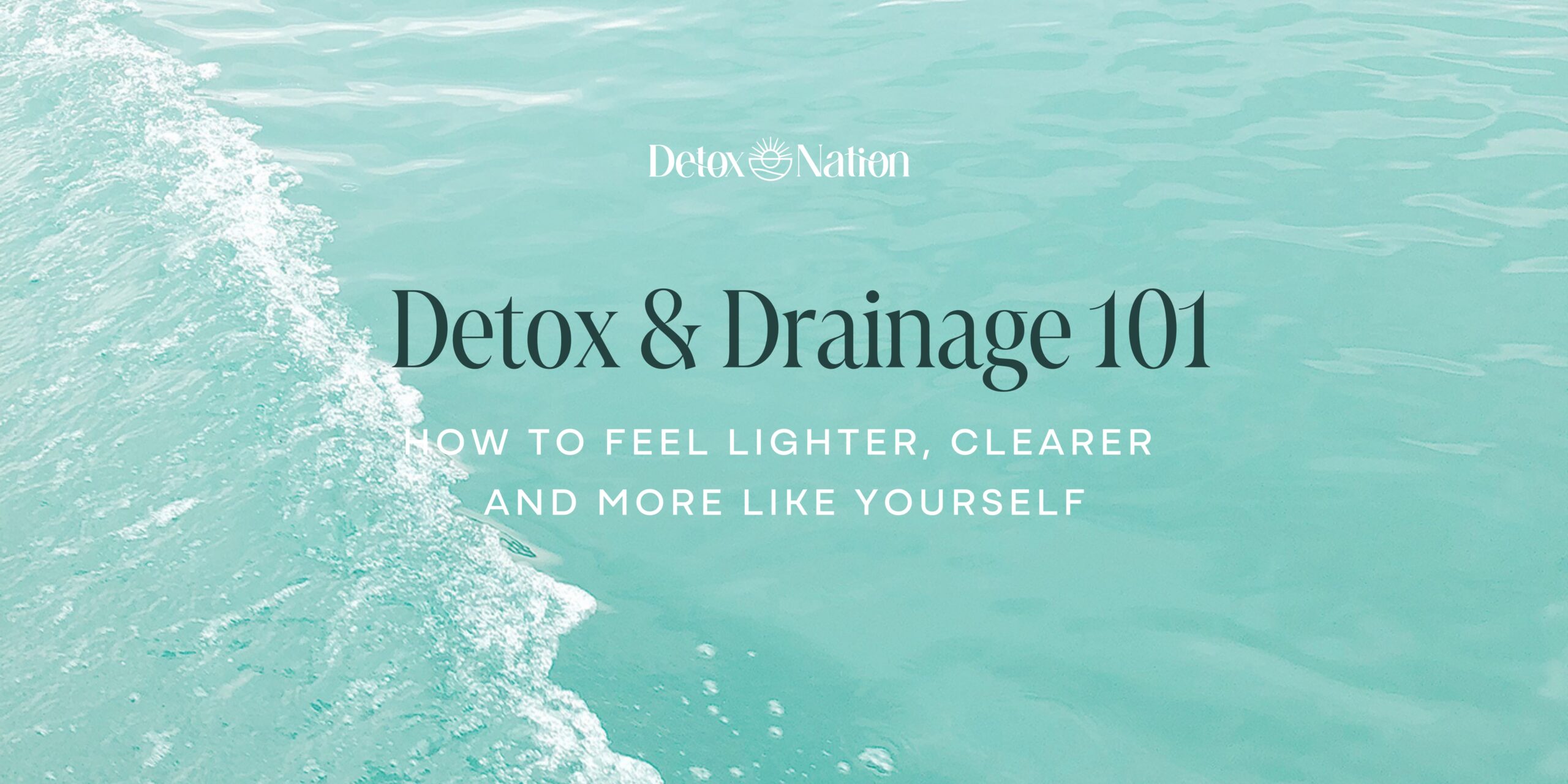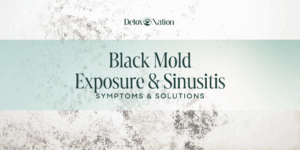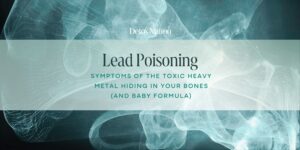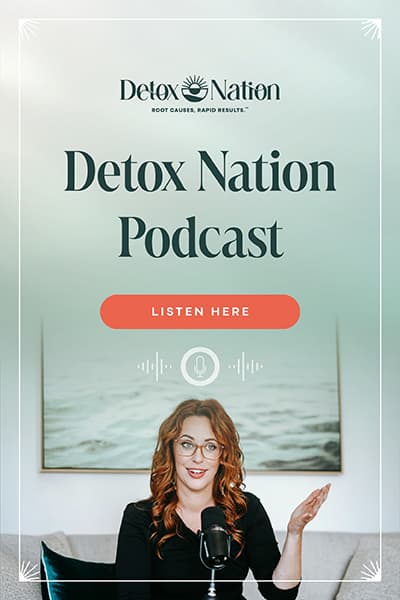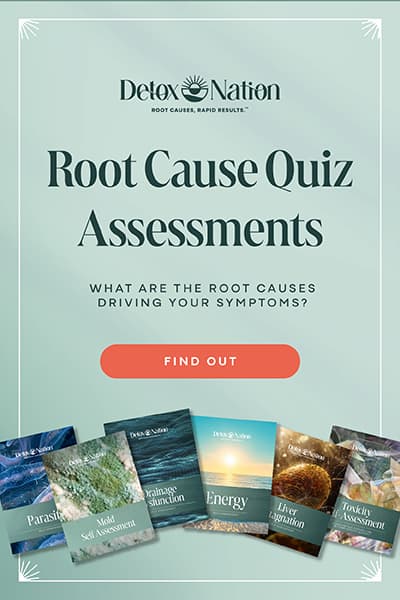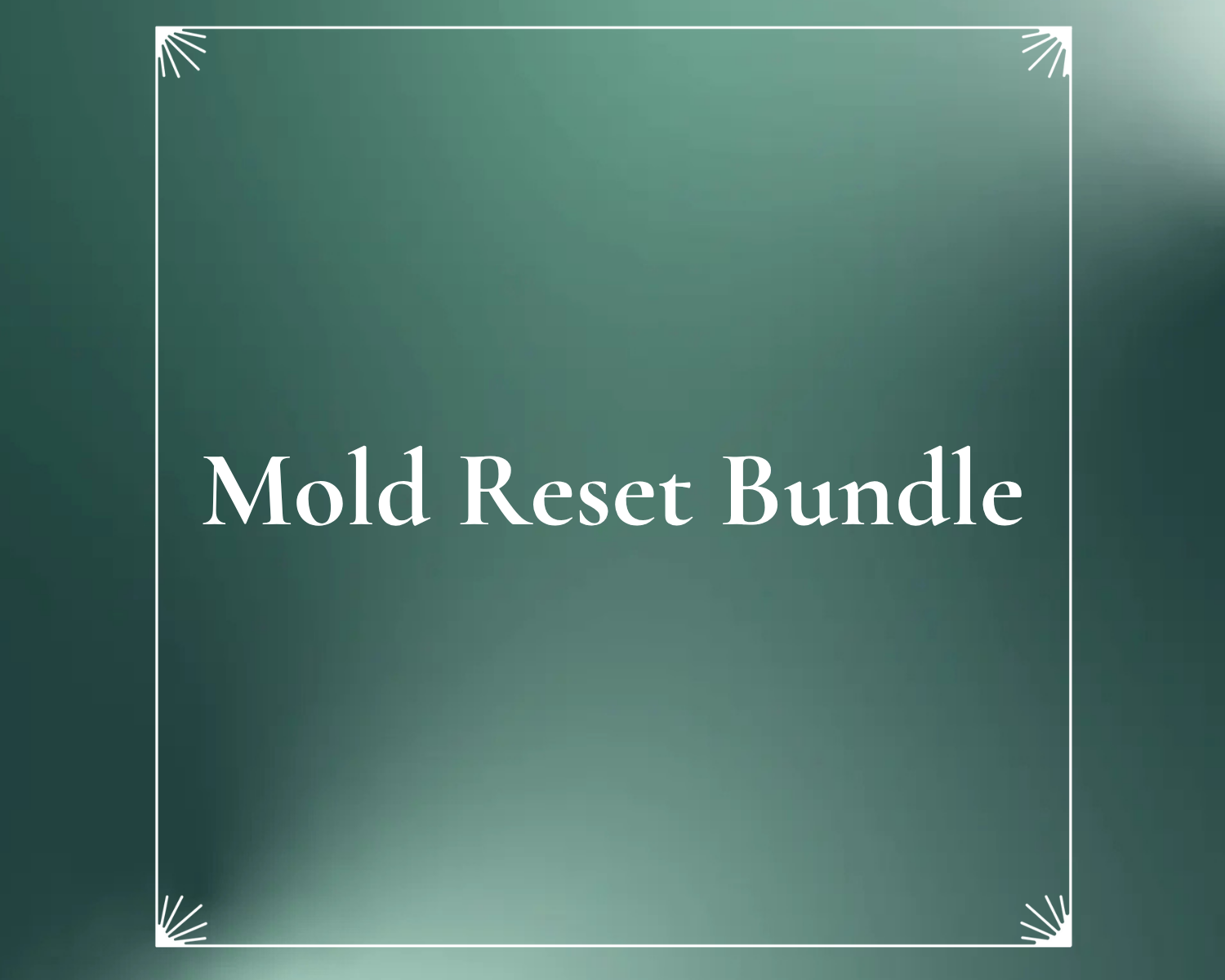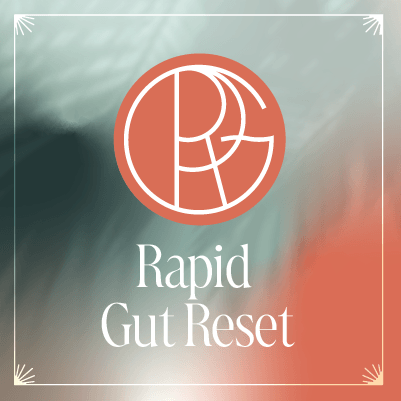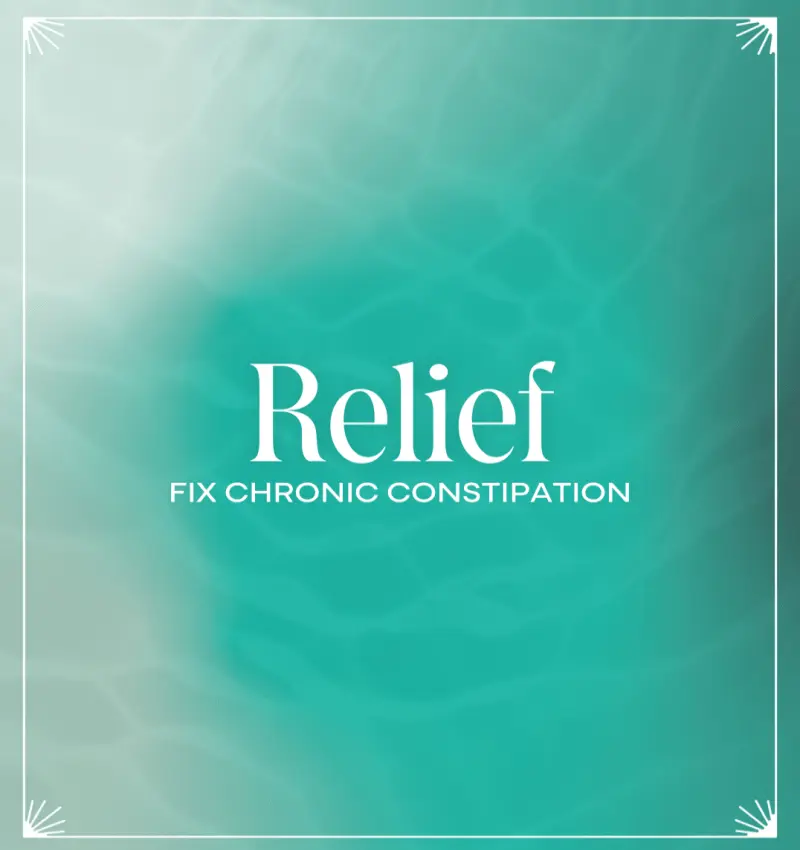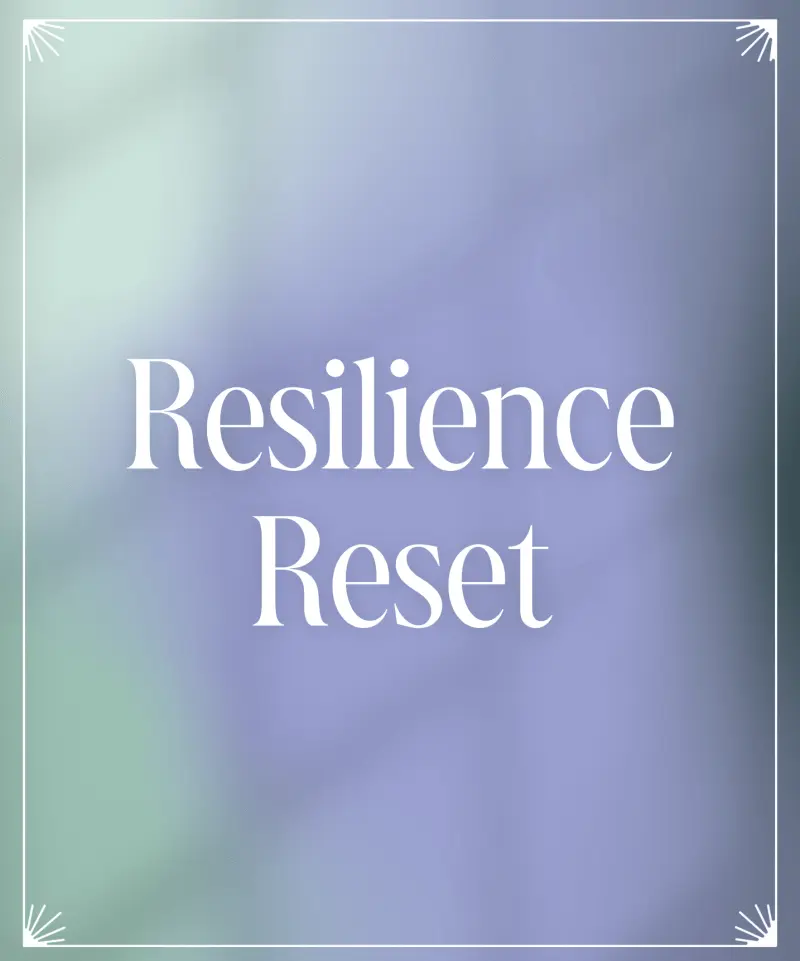Detox and Drainage 101
If you’ve been feeling puffy, sluggish, or like your brain decided to take an early retirement, you’re not alone—and you’re not crazy.
These are all signs that your detox and drainage systems might need some serious love.
Detox and drainage may sound like gross medical or waste management terms, but they’re actually how your body keeps the garbage from piling up inside you.
Without them, toxins stick around in your body—messy, disruptive, and impossible to ignore.
Here’s the thing: detox is your body’s way of breaking down harmful substances, but drainage is the exit route.
You can’t have one without the other and expect things to run smoothly.
If your drainage pathways are clogged, all the detoxing in the world won’t help—it’s like cleaning out your fridge and leaving the rotten food on the counter. Gross, right?
Or maybe even more to the point – it’s like trying to flush a clogged toilet and having it overflow all over your floor instead.
But don’t worry; this is fixable.
Your body is constantly working to heal, and with a little support, you can get these systems back on track.
Let’s dig into how detox and drainage work together to help you feel like yourself again—only better.
Key Takeaways
- Drainage is the first and most essential step in detoxification. Without clear drainage pathways, toxins can’t leave the body effectively.
- Detox is the process of breaking down and eliminating toxins, but it requires open drainage systems to work.
- Supporting both processes with movement, hydration, gut health, and lifestyle changes is key to lasting health and vitality.
Your body can break down toxins all day, but without proper drainage, those toxins have nowhere to go.
They can recirculate and make you feel even worse than before.
Drainage without detox is like having an efficient garbage pickup service with no garbage to take out.
If your body isn’t actively breaking down toxins, drainage has less to work with, and the underlying issues remain.
It’s a team effort—drainage needs detox to address the root of the problem and create lasting health improvements.
Detox and drainage are so important that multiple organs from different body systems pitch in to help!
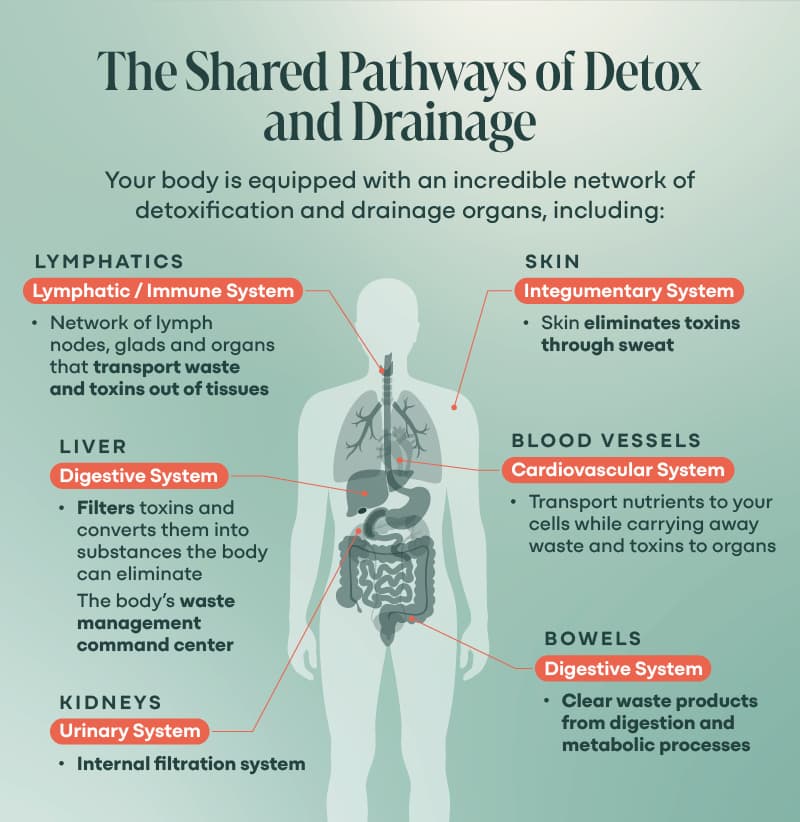
Detox vs Drainage?
Detox is your body’s way of dismantling toxins, so they’re easier to get rid of. Drainage is the process that moves those toxins out, ensuring they don’t stick around to cause trouble.
You must have both working together, so your body can fully reset and feel its best.
Detox without drainage?
It’s like scrubbing your floors but leaving all the dirt in a corner—it’s still there, just waiting to cause problems.
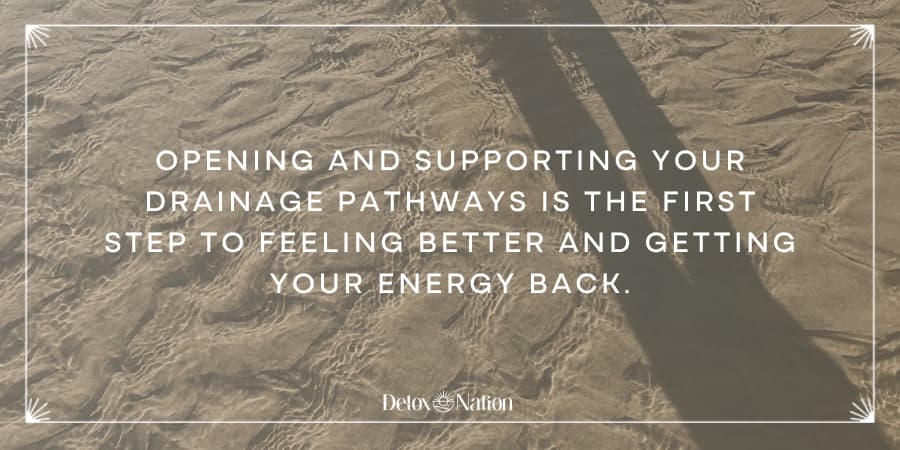
The Shared Pathways of Detox and Drainage
Your body is equipped with an incredible network of detoxification and drainage organs, including:
- Liver (Digestive System): The liver is the main detox powerhouse that filters toxins and converts them into substances the body can eliminate (1 , 19). It’s like the body’s waste management command center, processing everything from pollutants to the occasional indulgent treat. (Looking at you, Rocky Road!)
- Kidneys (Urinary System): the kidneys remove toxins through urine, acting as your body’s internal filtration system (9). They work quietly, ensuring waste products are efficiently flushed out.
- Lymphatics (Lymphatic / Immune System): The lymphatics are a network of vessels that transport waste and toxins out of tissues (5, 12, 13). Picture a highway system for your body’s trash—the lymphatic system ensures there’s no traffic jam.
- Skin (Integumentary System): The skin eliminates toxins through sweat (2). It’s your largest organ, always working behind the scenes to support detox.
- Bowels (Digestive System): The bowels clear waste products from digestion and metabolic processes. This is one pathway you’ll want moving daily, (yes, daily!) if not more.
- Blood Vessels (Cardiovascular System): Your blood vessels transport nutrients to your cells while carrying away waste and toxins to organs like your liver and kidneys for processing. Without healthy circulation, your detox pathways slow down, leaving your body feeling stagnant and bogged down.
Each system plays a unique role, but they’re all interconnected.
If one pathway is compromised, the others are forced to work harder, which can lead to symptoms like fatigue or skin issues.
And while not an organ or system, sleep is also a critical piece of the detox puzzle:
Sleep is like your body’s nightly detox shift—it’s when your brain and organs finally get to focus on cleaning house.
During deep sleep, your brain flushes out toxins, your liver kicks into high gear, and your entire system resets for the day ahead.
Skimping on sleep isn’t just exhausting; it slows down your body’s natural ability to heal and clear toxins.
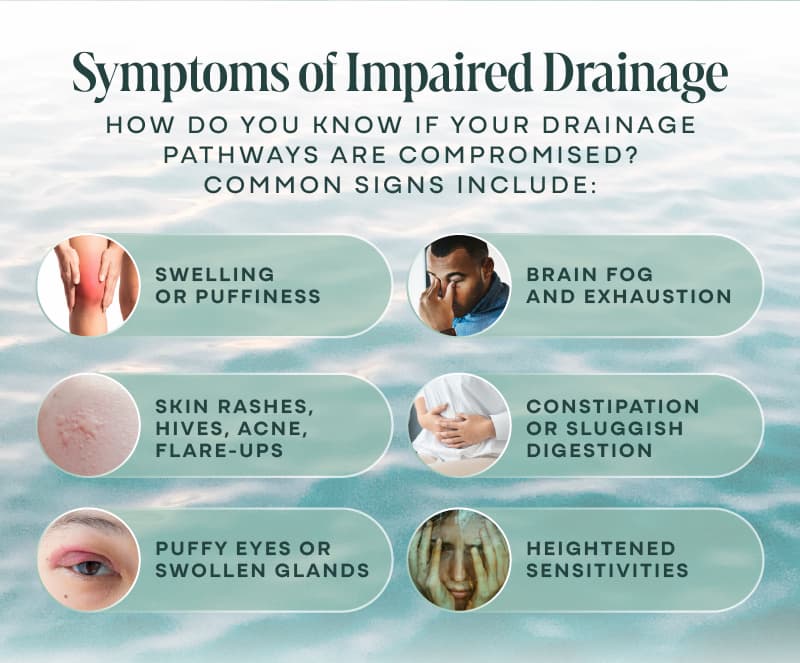
Drainage: The Foundation of Detox
Without proper drainage, toxins can get reabsorbed into your system, leading to what’s often referred to as “retox.”
To be crystal clear: Your drainage pathways must be open and functional for your body’s detox efforts to be successful. Drainage comes first.
How Drainage Works
Your drainage pathways collect alllll of the waste material and move it out of your body.
When these pathways are clear, your body can easily drain. But when they’re clogged—ooof.
Imagine a city with a broken sewage system. Trash piles up, causing smells, infections, and all-around chaos. That’s your body without proper drainage.
For example, if the lymphatic system is sluggish, you might experience puffiness, sore breasts, or swollen glands.
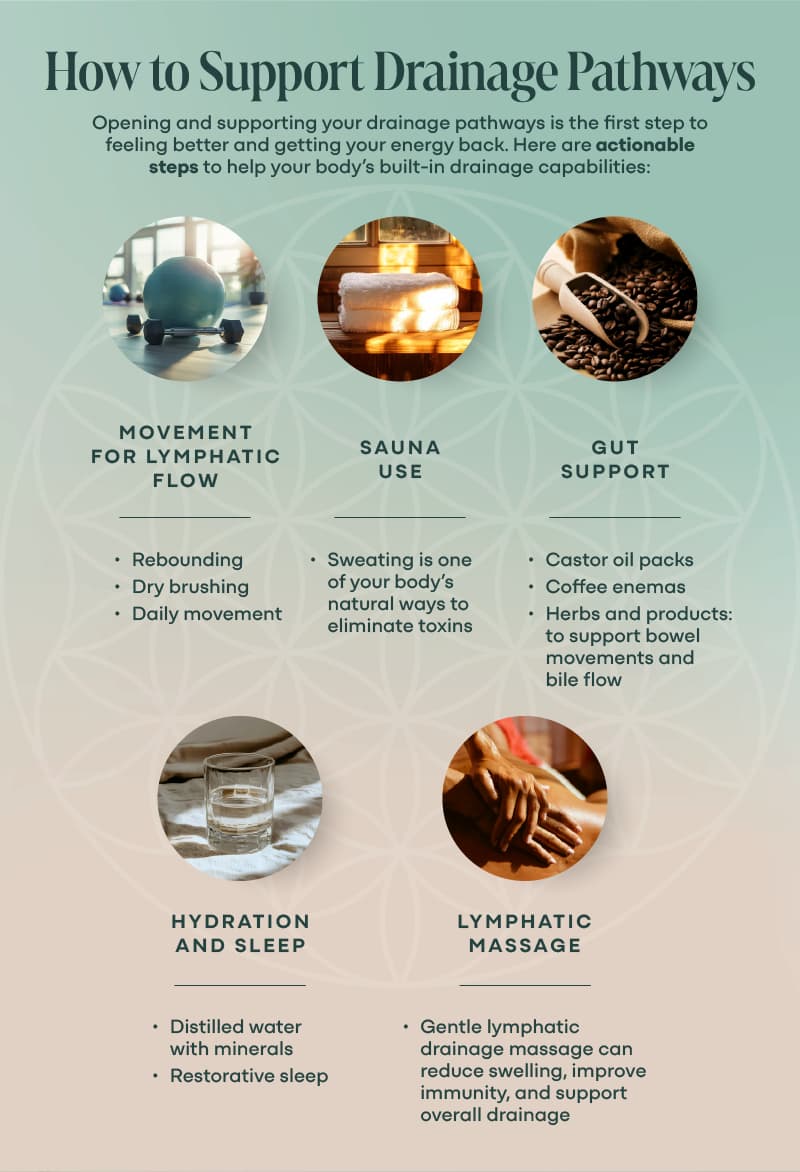
Symptoms of Impaired Drainage
How do you know if your drainage pathways are compromised? Common signs include:
- Swelling or puffiness: If you’re noticing that “inflated balloon” look in certain areas, it could be your body holding onto waste instead of clearing it out. Swollen, sore breasts? Think impaired drainage!
- Skin troubles (acne or rashes): Your skin is working overtime to eliminate toxins, showing up as breakouts or irritation when other detox pathways are struggling.
- Puffy eyes or swollen glands: This is your lymphatic system whispering (or shouting) that it’s overwhelmed and needs some TLC.
- Brain fog and exhaustion: When toxins stick around, your energy tanks and your focus feels like it’s stuck in quicksand.
- Constipation or sluggish digestion: A clear sign that your bowels aren’t doing their daily duty (pun intended) to move waste out efficiently.
- Heightened sensitivities (light, sound, or chemicals): When toxins pile up, your body can go into overdrive, reacting to things that usually wouldn’t bother you.
For instance, chronic sinus infections often signal that lymphatic drainage is impaired, while cellulite or flabby skin can indicate poor circulation and lymphatic flow.
These symptoms are your body’s way of getting your attention and trying to tell you there’s a problem.
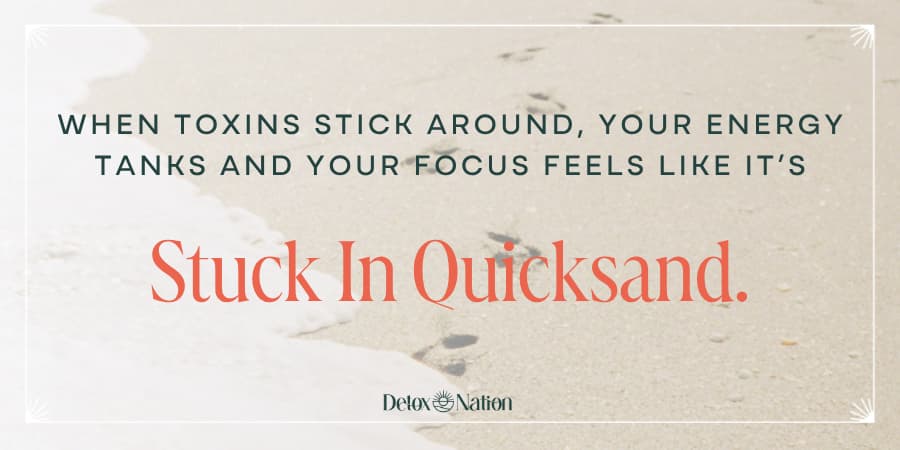
How to Support Drainage Pathways
Opening and supporting your drainage pathways is the first step to feeling better and getting your energy back. Here are actionable steps to help your body’s built-in drainage capabilities:
Movement for Lymphatic Flow
Movement is your lymphatic system’s best friend. Since it doesn’t have a pump like your heart, it relies on physical activity to keep things moving (12).
- Rebounding: Bouncing on a mini trampoline stimulates lymphatic circulation and helps move toxins out of tissues (4, 7). Just 10 minutes a day can make a difference! (Plus, it’s fun!)
- Dry brushing: Use a natural bristle brush to gently exfoliate skin and encourage lymphatic flow (4). Always brush toward your heart.
- Daily movement: Walking, yoga, and other gentle exercises keep your lymph moving (6). Bonus points for activities that incorporate deep breathing, which also supports the lymphatic system.

Sauna Use
- Sweating is one of your body’s natural ways to eliminate toxins (2). Regular sauna use can support this process, especially infrared saunas, which penetrate deeper into tissues (11).
- If you have difficulty sweating, it may signal that your drainage pathways need attention. Start with shorter sessions and build up as your body adapts.
Gut Support
Your gut plays a starring role in drainage (and detox), so keeping it healthy is essential.
- Castor oil packs: Placing these on your abdomen can improve digestion, support the liver, and promote hormone balance.
- Coffee enemas: Help clear the bowels, improve liver function, and boost antioxidant production (8). These are particularly helpful during heavy detox phases.
- Herbs and products: Consider options like TUDCA and specific herbs to support bowel movements and bile flow. These can work miracles for persistent constipation or sluggish bowels.
Ready for more tips and tools to support your health?
Sign up for our newsletter to get the goods delivered straight to your inbox.
Sign Up For Our Newsletter TodayHydration and Sleep
- Distilled water with minerals: Distilled water is stripped of not just impurities but also the beneficial minerals your body needs to function. Adding trace minerals to your distilled water helps your cells stay hydrated, supports electrolyte balance, and ensures your body can properly detox and repair. Without those minerals, distilled water can leach nutrients from your body, which is the opposite of what we want! Water is at the foundation of the human body, and you can’t have health without it (3)!
- Restorative sleep: Essential for overall healing, drainage, and detoxification. Aim for 7-9 hours of quality sleep per night, as this is when your body performs many of its repair and detox functions. (More on this later!)
Lymphatic Massage
- Gentle lymphatic drainage massage can reduce swelling, improve immunity, and support overall drainage. You can do this yourself with light pressure or visit a professional for deeper work.
Now that we’ve discussed drainage, let’s turn our attention to detoxification!
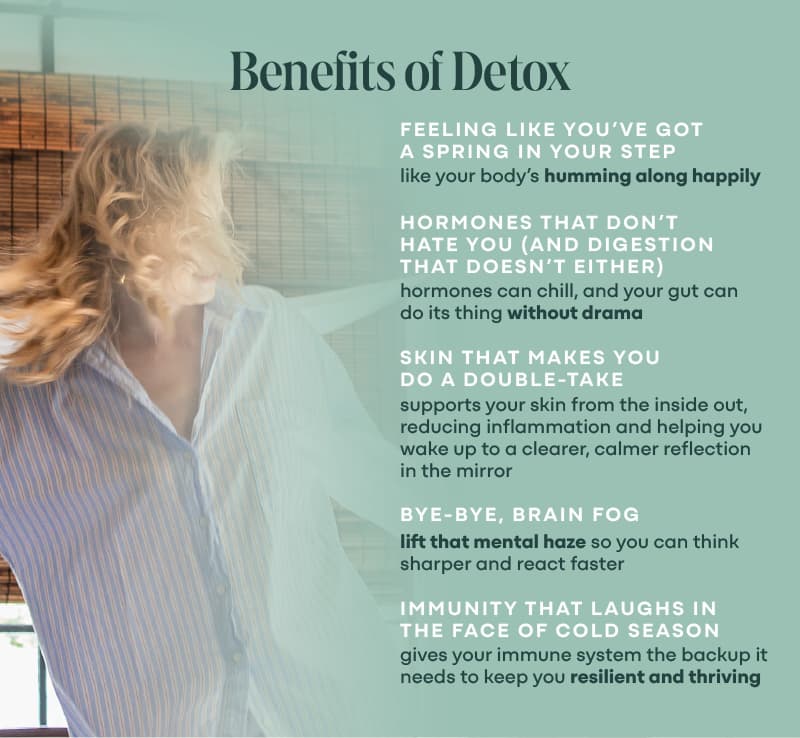
Why Do You Need to Detox?
Detoxification isn’t some trendy wellness buzzword; it’s your body’s built-in cleanup crew, working overtime to deal with all the gunk you throw at it.
And trust me, the toxins come from everywhere.
Your favorite fast-food indulgence? Yep, there’s a price.
That “clean beauty” product you swore was safe? Surprise, it’s not.
Even your own body’s natural processes create junk that needs taking out. (Thanks, metabolism.)
Your detox system is sorting, breaking down, and hauling off harmful substances 24/7, just to keep you functioning.
The next time you hear “detox,” remember: it’s not just a juice cleanse or some spa treatment—it’s the constant, behind-the-scenes work your body desperately needs you to support.

Benefits of Detox
Life can feel like a constant hustle, and sometimes your body needs a little reset.
A good detox isn’t about deprivation, it’s about giving your body the chance to clear out the clutter and get back to feeling like your best self.
Here’s a few of the health benefits of detox to get you thinking about the possibilities!
- Feeling Like You’ve Got a Spring in Your Step: Remember that rare morning when you woke up without hitting snooze five times? That’s the energy we’re talking about—times ten. Clearing out toxins can help you feel awake, like your body’s humming along happily instead of dragging through mud all day.
- Hormones That Don’t Hate You (and Digestion That Doesn’t Either): Hormones and digestion are like your body’s backstage crew—when they’re not working smoothly, everything goes haywire. Detoxing helps clear out the garbage that’s clogging up the system, so your hormones can chill, and your gut can do its thing without drama.
- Skin That Makes You Do a Double-Take: Blemishes, rashes, or that mysterious red blotch (you know the one) aren’t your favorite accessories. Detoxing supports your skin from the inside out, reducing inflammation and helping you wake up to a clearer, calmer reflection in the mirror.
- Bye-Bye, Brain Fog: You know that moment when you walk into a room and completely forget why you’re there? Yeah, same. Detoxing can help lift that mental haze so you can think sharper and react faster. Bonus: Your random trivia game might actually improve. Watch out, Jeopardy.
- Immunity That Laughs in the Face of Cold Season: Picture this: your body, armed and ready to handle whatever life throws at it—be it the sniffles, stress, or that questionable potato salad at the barbecue. Detoxing gives your immune system the backup it needs to keep you resilient and thriving. Superhuman cape not included.
For instance, people often notice clearer skin after supporting detox, as the body shifts toxins out through the liver and kidneys instead of pushing them through the skin.
But here’s the catch: your body’s detox systems rely on open and functioning drainage pathways to do their job effectively.
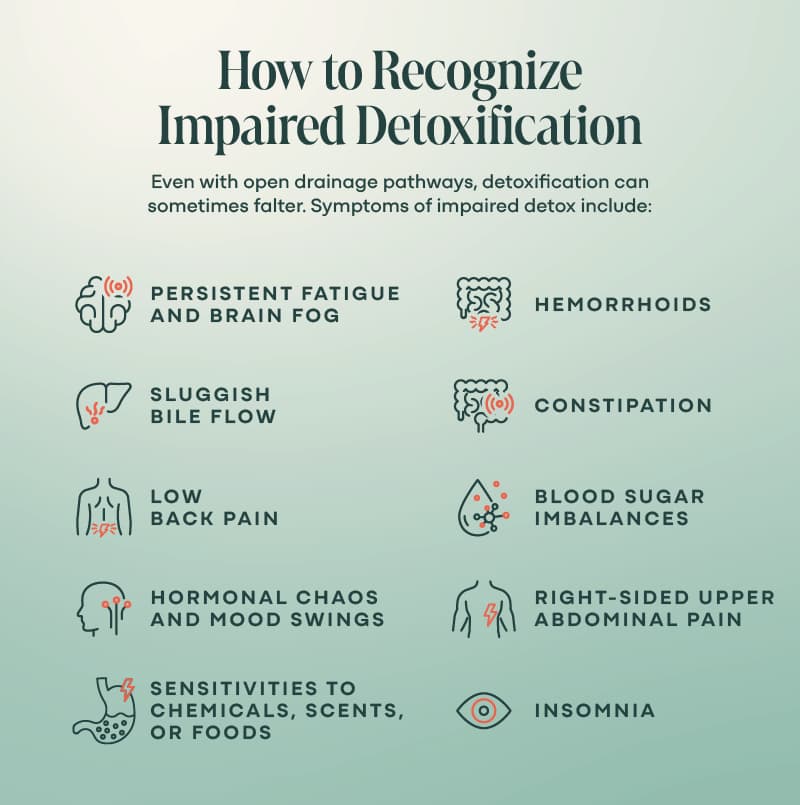
How to Recognize Impaired Detoxification
Even with open drainage pathways, detoxification can sometimes falter. Symptoms of impaired detox include:
- Persistent Fatigue and Brain Fog: When you feel like a zombie shuffling through life, it’s often a sign your detox pathways are backed up and your body’s energy reserves are tapped.
- Sluggish Bile Flow: When your liver is congested, bile doesn’t flow the way it should. The result? You feel sluggish, bloated, and cranky—like a Monday morning in rush hour.
- Low Back Pain: This isn’t just “I slept funny” pain—it’s the kind that makes you feel ancient. Your kidneys and liver are throwing tantrums, and guess where they send their complaints? Straight to your lower back. Is it detox issues or the fact I thought I could still lift heavy boxes without consequences? We may never know.
- Hormonal Chaos and Mood Swings: Feel like you’re starring in a rom-com where you cry at dog food commercials? Your liver helps metabolize hormones, and when it’s sluggish, your estrogen and cortisol levels go rogue. It’s not just PMS—it’s your liver saying, “Help me, help you!”
- Sensitivities to Chemicals, Scents, or Foods: When your body reacts to things that never used to bother you, it’s a signal that toxins may be building up and overwhelming your system.
- Hemorrhoids: These painful, swollen veins are often tied to constipation and poor circulation, signaling that your detox and drainage pathways might be struggling to keep things moving.
- Constipation: Oh, the glamour of being human! When your detox pathways are blocked, it’s like your body’s trash collector went on strike. Cue the bloating, cramping, and a sense of doom every time you glance at the bathroom.
- Blood Sugar Imbalances: Are you riding the sugar rollercoaster from “Hangry” to “Nap Time”? Your liver plays a big role in managing blood sugar, so when it’s sluggish, you’re stuck in snack purgatory. If you’ve ever yelled, “WHO ATE MY SNACKS?!” at your family, this one’s for you.
- Right-Sided Upper Abdominal Pain: That sharp, nagging ache under your ribs isn’t just a random twinge. It’s your liver or gallbladder saying, “Hello, I’m drowning over here!” It’s like the liver’s version of leaving passive-aggressive notes. You can’t ignore it forever.
- Insomnia: Liver detox peaks between 1 and 3 AM, so if you’re wide awake at those hours, it’s a sign your body’s struggling to clean house. Cue the racing thoughts, endless scrolling, and existential dread about life choices. Sure, you could blame Netflix for your late nights… but maybe it’s your liver, too.
These aren’t just random annoyances—they’re your body’s SOS for detox support. (And yes, the symptoms of impaired drainage and impaired detox have a lot of overlap!)
It’s time to listen and give it the care it’s asking for!
We’ve been talking about drainage and detox in general. I want to take a minute to mention the drainage and detox of your brain.

Special Topic: Brain Detox and the Glymphatic System
While your brain only makes up about 2% of the mass of your body, it’s responsible for about 25% of the metabolic demand (18).
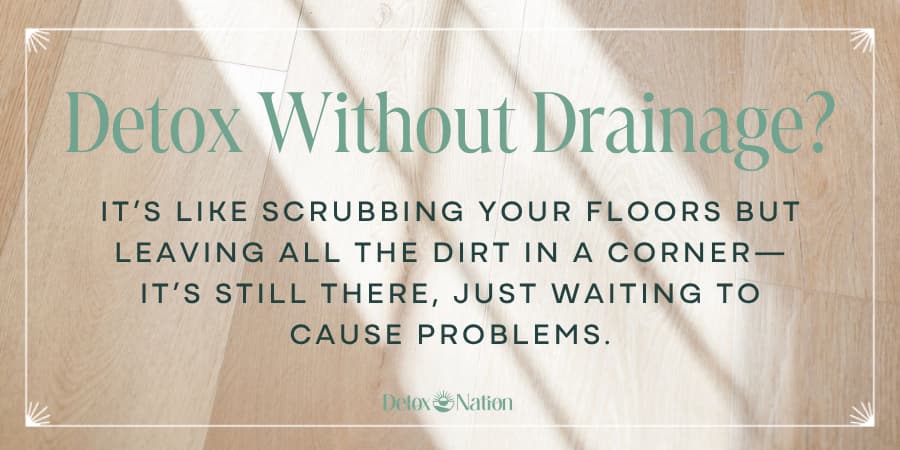
How to Support Detox
Once your drainage pathways are functioning well, you can begin supporting detoxification with the following steps:
Gradual Liver Support
- Incorporate liver-loving foods like cruciferous vegetables (broccoli, kale) and herbs like milk thistle. These help boost liver function without overwhelming it.
- Avoid overwhelming the liver by starting with gentle detox protocols. For example, adding lemon water in the morning can give your liver a gentle nudge.
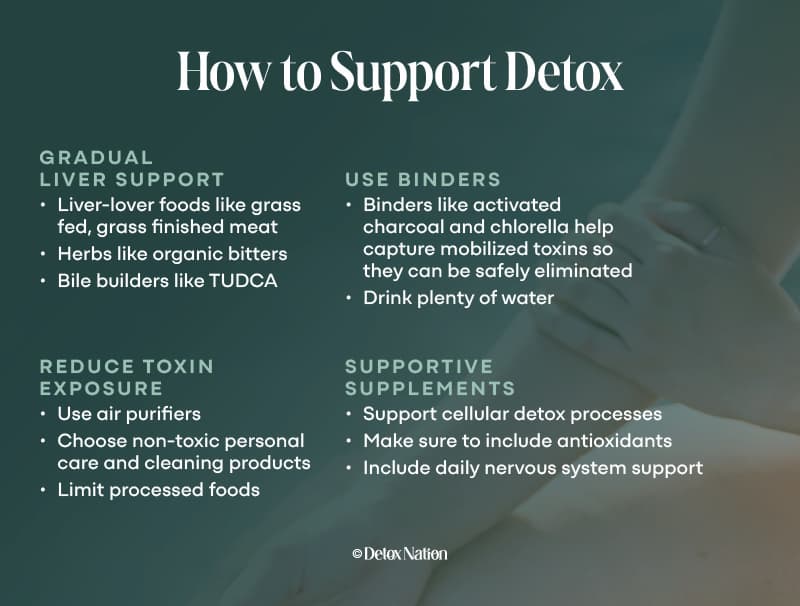
Use Binders
- Binders like activated charcoal and chlorella help capture mobilized toxins so they can be safely eliminated. Be sure to drink plenty of water to prevent constipation.
Yet one more reason that optimizing brain detox is non-negotiable!
The glymphatic system is like your brain’s personal cleaning crew, working behind the scenes to clear out toxins, metabolic waste, and even harmful proteins that can accumulate during the day.
It works through specialized pathways that use cerebrospinal fluid (CSF) to wash waste out of your brain and into the body for removal.
This system is most active when you’re in deep sleep, which is why those late nights binge-watching TV aren’t doing your brain any favors (14).
This process doesn’t happen in isolation—it works in tandem with the brain’s lymphatic drainage system, a network of pathways that shuttle waste out of your central nervous system.
Together, they’re responsible for keeping your brain clear and healthy, reducing the buildup of toxins that can contribute to neurodegenerative diseases like Alzheimer’s (15, 16).
And here’s the cool part: research shows that the glymphatic system is influenced not only by sleep but also by your body’s hydration, inflammatory levels, and even your position while you rest.
Sleeping on your side, for instance, has been linked to better glymphatic flow.
So, the next time you catch yourself skimping on sleep or skipping your water, remember—you’re not just robbing yourself of energy; you’re shortchanging your brain’s nightly detox (17, 18).
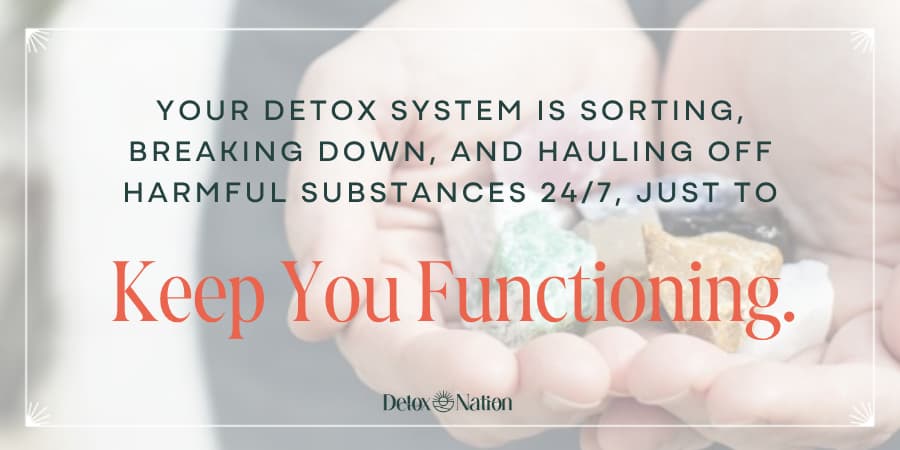
Reduce Toxin Exposure
- Use air purifiers and choose non-toxic personal care and cleaning products. Reducing exposure lightens the toxic load on your system.
- Limit processed foods and artificial additives, which can burden your liver.
Supportive Supplements
- Include specific supplements to support cellular detox processes. Make sure to include antioxidants as they are vital for neutralizing free radicals created during detox.
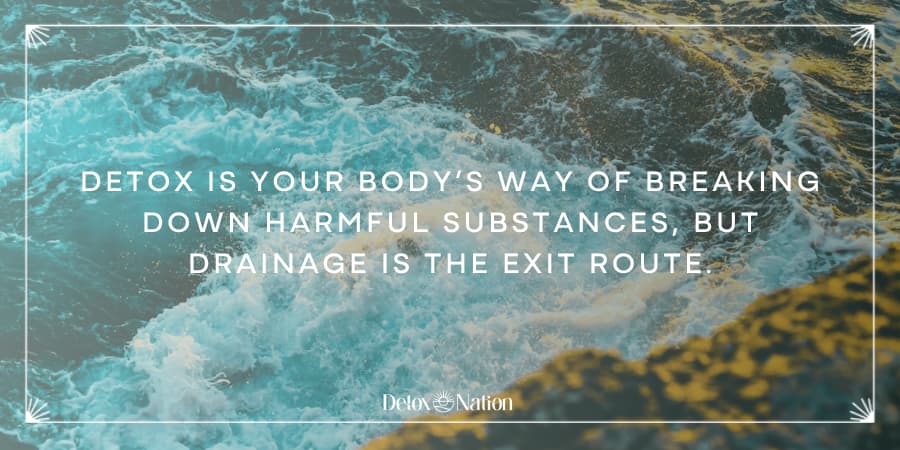
Making Drainage and Detox a Lifestyle
Preventative maintenance is the key to sustaining your health in today’s toxin-laden world. Here’s how to integrate drainage and detox into your daily life:
Daily Habits for Long-Term Vitality
- Start your day with movement, hydration, and mindfulness practices.
- Incorporate regular sauna sessions or lymphatic massage into your routine.
- Maintain a balanced diet rich in whole, organic foods (10).
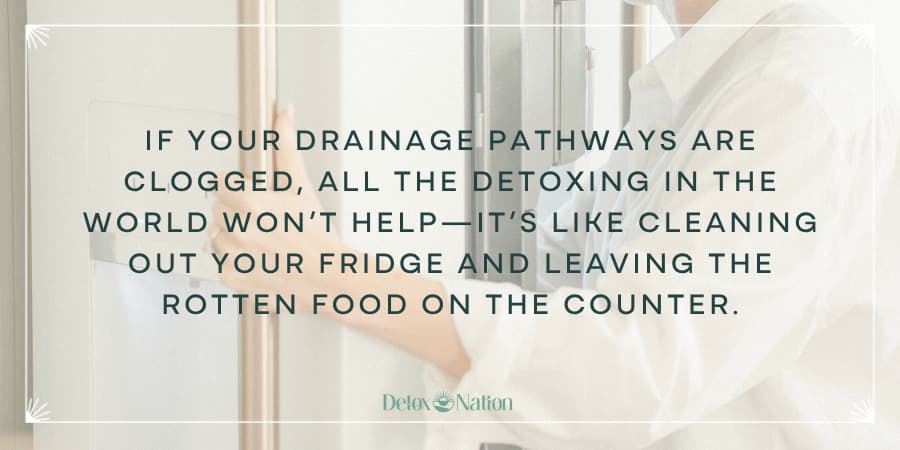
Why Consistency Matters
By making drainage and detox a regular practice, you create a resilient foundation for your health. This approach reduces the likelihood of chronic symptoms and empowers you to feel your best every day.

Your Healing Journey Starts Here
Your body doesn’t need the latest trendy cleanse—it needs your targeted support to do the work it’s already designed for.
By focusing on drainage first, you’re laying the foundation for effective detox, better energy, clearer skin, and that elusive mental clarity we all dream of.
It’s easy to feel overwhelmed when you’re not feeling your best, but don’t overcomplicate it.
Your body is resilient, and it wants to heal—it just needs you to show up and make the effort.
So, drink that water, bounce on that trampoline, and get to bed a little earlier tonight.
It’s not always easy, but it’s worth it—because a vibrant, energized, and clear-headed version of you is waiting on the other side.
Ready for more tips and tools to support your health?
Sign up for our newsletter to get the goods delivered straight to your inbox.
Sign Up For Our Newsletter TodayFAQ: Your Detox Questions Answered
1. How often should I detoxify?
Detox isn’t a one-time event. Think of it as a lifestyle. Supporting your outflow pathways daily and doing more intensive detoxification protocols 2-3 times a year can keep your body running smoothly.
2. Can I skip drainage and go straight to detoxification?
No. Skipping drainage can lead to detox, where mobilized toxins recirculate in your body, potentially making you feel worse. Always prioritize drainage first.
3. How do I know my lymphatic system and drainage pathways are open?
Signs include regular bowel movements (1-3 times daily), reduced puffiness, clearer skin, and improved energy. If you’re still experiencing symptoms like swelling or brain fog, revisit outflow support.
4. What’s the best way to start detoxing?
Start with gentle liver support, such as drinking lemon water, and ensure you’re staying hydrated. Reduce inflammatory foods and introduce supplements to support drainage before adding in detox protocols.
5. Can I overdo detoxification?
Yes. Overloading your detoxification systems can cause fatigue, bloating, headaches, rashes, and other symptoms. Always listen to your body and work with a professional if needed.
6. How do toxins leave the body?
Toxins (including chemical toxins, mycotoxins, and more) are processed by the liver, filtered through the lungs and kidneys, and eliminated as waste via pooping, peeing, sweating, and lymphatic vessels. Keeping the entire system flowing ensures toxins leave efficiently at the cellular level.
7. How do the lymph system and circulatory system support detox and drainage?
Your lymphatic system, a network of vessels carrying lymph fluid, works with your circulatory system to remove fluids from body tissues, transport immune cells, and move lymph for toxin elimination. Proper outflow helps your entire system stay in balance.

